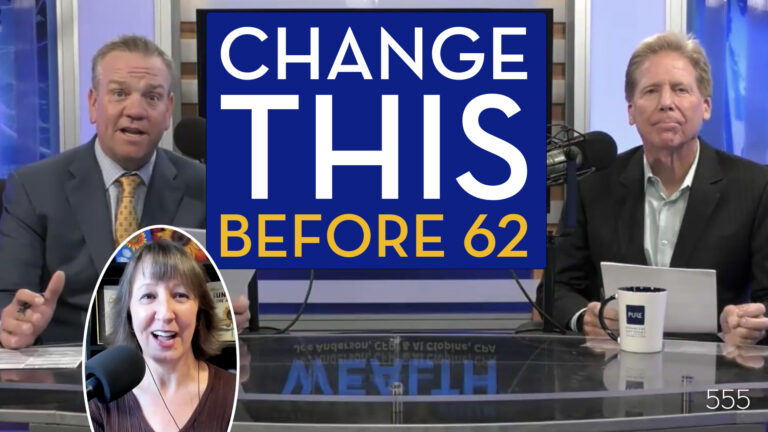Would contributions to a traditional IRA reduce your tax burden? How do you start saving money at a young age and what are the benefits of a Roth IRA? Joe Anderson, CFP® and Alan Clopine, CPA answer your email questions in YMYW podcast episode 89. Original publish date December 11, 2016 (hour 2). Note that content may be outdated as rules and regulations have changed.
02:31 – “Would contributions to our traditional IRAs reduce our tax burden? My wife and I currently have no tax write-offs and our mortgage is paid off on our home. I contribute the maximum to my 403(b), but I also have a traditional IRA and a Roth IRA, as does my wife. We have been contributing to our Roth IRAs over the years to the neglect of the traditional IRAs. I was wondering if it would make sense to start contributing to the traditional IRAs so we can start to decrease our tax burden every year. Of course, the benefit of the Roth would have tax advantages years from now when I retire. My wife and I are both in our late 40s and I have about 10 to 11 years before I think I can retire.”
10:52 – “How should I start saving? I just started my first job and they don’t provide 401(k)s. What should I do to prepare for life, and to start saving? I’ve heard a Roth IRA is the way to go. Is this something I want? Other than tax benefits, does it grow?”
15:24 – “What are the tax implications of removing part of my IRA to give to my ex-wife? My ex-wife and I had separate IRAs. We divorced in 2014, but I kept the house. I owe her money in several months as a first payment on the value of the home. What are the income tax issues I will face by removing a large portion of my IRA to hand over to her?”
19:09 – “Will a loss on our sold home off-set taxes on a 401(k) withdrawal? My wife is 65 years old and I will be turning 65 in May 2017. We are planning to move out of California to Las Vegas for good. I will have to withdraw 100% of my 401(k) to put as a down payment to purchase a home in Las Vegas. Then, we plan to sell our house in California which is paid-off. We believe that after the sale, we will have a loss. Would we be able to use that loss to reduce taxes on the 401(k) or IRA withdrawal?”
24:38 – “Will a Trump presidency reduce the tax and regulatory burdens placed on my small business? I own a small business in the New York area and have recently started to work on our 2017 financial projections. I have spoken to a number of friends, family and other small business owners about the ramifications of a Trump Presidency. Although I do not agree with many of his polices, I am hopeful that he will be able to reduce the tax and regulatory burdens of operating a business. When creating my forecast, what should assume and what should I ignore?”
27:35 – “Will I be thrown into a higher tax bracket due to a high ordinary income tax? I reach age 66 in July, full retirement age, and will continue working. I’m considering taking Social Security retirement at 66 and contributing to a 403(b) account to increase the balance. Is the entire amount, Social Security and wages, taxed as ordinary income, so that I will be thrown into a higher tax bracket? Is Social Security income counted dollar for dollar? Would it pay me to invest the max amount in my 403(b)?”
*Questions derived from Investopedia Advisor Insights
Listen to the YMYW podcast:

Amazon Music
AntennaPod
Anytime Player
Apple Podcasts
Audible
Castbox
Castro
Curiocaster
Fountain
Goodpods
iHeartRadio
iVoox
Luminary
Overcast
Player FM
Pocket Casts
Podbean
Podcast Addict
Podcast Index
Podcast Guru
Podcast Republic
Podchaser
Podfriend
PodHero
podStation
Podverse
Podvine
Radio Public
Rephonic
Sonnet
Spotify
Subscribe on Android
Subscribe by Email
RSS feed

YouTube Music
IMPORTANT DISCLOSURES:
Pure Financial Advisors is a registered investment advisor. This show does not intend to provide personalized investment advice through this broadcast and does not represent that the securities or services discussed are suitable for any investor. Investors are advised not to rely on any information contained in the broadcast in the process of making a full and informed investment decision.
• Investment Advisory and Financial Planning Services are offered through Pure Financial Advisors, LLC, a Registered Investment Advisor.
• Pure Financial Advisors LLC does not offer tax or legal advice. Consult with your tax advisor or attorney regarding specific situations.
• Opinions expressed are not intended as investment advice or to predict future performance.
• Past performance does not guarantee future results.
• Investing involves risk including the potential loss of principal. No investment strategy can guarantee a profit or protect against loss in periods of declining values.
• All information is believed to be from reliable sources; however, we make no representation as to its completeness or accuracy. As rules and regulations change, content may become outdated.
• Intended for educational purposes only and are not intended as individualized advice or a guarantee that you will achieve a desired result. Before implementing any strategies discussed you should consult your tax and financial advisors.
CFP® – The CERTIFIED FINANCIAL PLANNER™ certification is by the Certified Financial Planner Board of Standards, Inc. To attain the right to use the CFP® designation, an individual must satisfactorily fulfill education, experience and ethics requirements as well as pass a comprehensive exam. Thirty hours of continuing education is required every two years to maintain the designation.
AIF® – Accredited Investment Fiduciary designation is administered by the Center for Fiduciary Studies fi360. To receive the AIF Designation, an individual must meet prerequisite criteria, complete a training program, and pass a comprehensive examination. Six hours of continuing education is required annually to maintain the designation.
CPA – Certified Public Accountant is a license set by the American Institute of Certified Public Accountants and administered by the National Association of State Boards of Accountancy. Eligibility to sit for the Uniform CPA Exam is determined by individual State Boards of Accountancy. Typically, the requirement is a U.S. bachelor’s degree which includes a minimum number of qualifying credit hours in accounting and business administration with an additional one-year study. All CPA candidates must pass the Uniform CPA Examination to qualify for a CPA certificate and license (i.e., permit to practice) to practice public accounting. CPAs are required to take continuing education courses to renew their license, and most states require CPAs to complete an ethics course during every renewal period.









